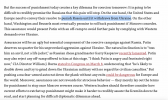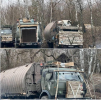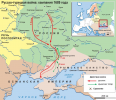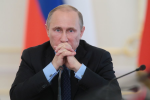Kamil Galeev
How to defeat Putin? Many recognise the importance of coercive measures against Russia and necessity to give it a way out And yet, some presume that the way out should be given to Putin to force him to negotiate. That's a disastrous idea. There's no way he can roll back now
https://twitter.com/kamilkazani

Consider negotiations between Russian and Ukraine. They didn't reach any agreement, and they couldn't. Why? Look whom Putin sent as a chief of delegation - Medinsky. Medinsky is a MGIMO professor who wrote the book on greatness of Russia and was appointed a Minister of Culture
 https://twitter.com/kamilkazani
59min
https://twitter.com/kamilkazani
59min
If Putin was aiming for negotiations he would send someone from intelligence/security apparatus. But instead he sent Medinsky, a cheap propagandist with no authority and no influence, who's looked down upon in Kremlin. Putin doesn't aim for negotiations or for peace with Ukraine
 https://twitter.com/kamilkazani
https://twitter.com/kamilkazani
That's understandable. Putin tried to launch a Special Operation, but triggered a small victorious war. And nothing is more dangerous for any Russian regime than a defeat in such a war. Historically speaking, Russian regimes usually fell a result of losing small victorious wars

Nothing was more detrimental for Soviet mythos than the defeat in Afghanistan. Materially speaking Soviet losses were not *that* huge, and Russia itself wasn't endangered. But the shame of defeat delegitimised the regime. In 1989 Soviet troops left Afghanistan, in 1991 USSR fell

Defeat in Russo-Japanese War killed Russian Empire. Again, Russia fought with smaller and weaker enemy and could continue the war until Japan runs out of people. But defeats from small and presumable inferior enemy were so shameful that Imperial mythos was destroyed. Empire fell
Muscovy also died as a result of a small victorious war. In late 17th c Russia was ruled by the regent Sofya with her lover prince Golitsyn. They were both Western-educated, fluent in Latin, but influenced primarily by the Catholic culture. At this age Russia was deeply polonised
Muscovy also died as a result of a small victorious war. In late 17th c Russia was ruled by the regent Sofya with her lover prince Golitsyn. They were both Western-educated, fluent in Latin, but influenced primarily by the Catholic culture. At this age Russia was deeply polonised
Sofya was a regent ruling in the name of her two younger brothers who were co-Tsars: Ivan and Peter. To increase his grasp over Muscovy, Sofya's boyfriend Golitsyn decided to finish off Crimean Khanate and amassed a huge Western-trained army for this new conquest
With his huge army Golitsyn marched south, towards Crimea for the first time. But Tatars burnt the steppe, harassed the supply lines. Golitsyn suffered no major defeat but had to turn back. His authority was shaken, he started getting death threats, assassination attempts

second expedition failed, too. They reached the Wall of Crimea couldn't take it and turned back. Technically it wasn't a defeat. He got some formal concessions from Khan. Sofya & Golitssyn presented it as a victory. They showered army & widows of dead soldiers with lavish awards
https://twitter.com/kamilkazani/status/1503063572129189890/photo/1
The same year, Sofya's brother, a co-Tsar Peter made a coup. Although the military were showered with awards by Sofya, in critical moment nobody stood in here defence. Muscovy died and Russian Empire emerged. It was far more Protestant and North European than the previous regime
Russian regime can survive poverty, stagnation, political repressions. But it can hardly survive defeat in a small victorious war. A Tsar absolutely can rule, while being hated (like Peter I). But he can't rule without being respected. And a shameful defeat destroys any respect
At this point Putin is trapped. His initial assumptions when attacking Ukraine were wrong. Foreign Department of FSB (N5) lied to him, telling whatever he wants to here. He though Ukraine will break quickly but it didn't. And yet, Putin can't turn back. If he does, he's doomed

It's not an accident. That's a systemic factor. Russian regime suffers from subordinates reporting only good and pleasant news to the ruler. When there were technical problems with construction of Akkuyu nuclear plant in Turkey, dozens of higher-ups knew. Nobody told it to Putin
It is nice to be nice. Every courtier wants to be associated with nice and pleasant stuff. Nobody wants to be punished for delivering a bad message (happens all the time). So courtiers were pushing each other but nobody stepped forward and reported. Everyone knew except for Putin











